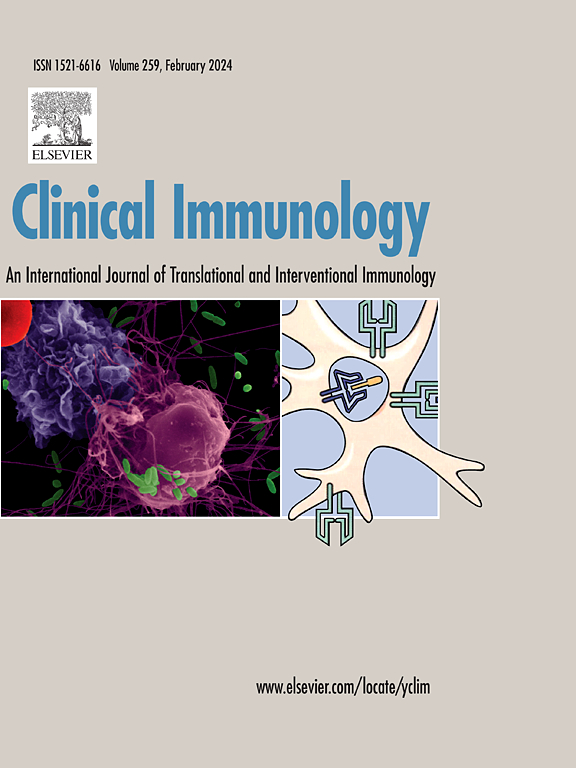Measuring efficacy for myasthenia gravis treatments: A review of biomarkers used in clinical trials
IF 3.8
3区 医学
Q2 IMMUNOLOGY
引用次数: 0
Abstract
Myasthenia gravis is an autoimmune disease that impairs neuromuscular transmission through autoantibodies, most commonly targeting acetylcholine receptors (AChR). While clinical scores like the Quantitative Myasthenia Gravis Score (QMGS) and the Myasthenia Gravis Activities of Daily Living Scale (MG-ADL) are commonly used in trials, there is no gold standard biomarker for evaluating treatment efficacy. This scoping review aimed to identify which biomarkers are most frequently used in randomized controlled trials (RCTs) for non-surgical treatments of generalized myasthenia gravis. We searched five databases for English-language RCTs published before May 9, 2024. Of 6685 screened texts, 33 met inclusion criteria. A total of 33 distinct biomarkers were tracked across studies, with AChR antibodies, IgG, and IL-2 most frequently reported. Biomarkers were measured inconsistently and at varied intervals, limiting cross-study comparability. The lack of standardized biomarker use hinders the ability to assess treatment efficacy and perform meta-analyses. We recommend developing consensus guidelines to improve future trial quality.
测量重症肌无力治疗的疗效:临床试验中使用的生物标志物综述。
重症肌无力是一种自身免疫性疾病,通过自身抗体损害神经肌肉传递,最常见的靶向是乙酰胆碱受体(AChR)。虽然临床评分如定量重症肌无力评分(QMGS)和重症肌无力日常生活活动量表(MG-ADL)通常用于试验,但没有金标准的生物标志物来评估治疗效果。本综述旨在确定在非手术治疗广泛性重症肌无力的随机对照试验(rct)中最常用的生物标志物。我们在5个数据库中检索了2024年5月9日之前发表的英语rct。在6685篇筛选的文献中,33篇符合纳入标准。研究共追踪了33种不同的生物标志物,其中最常报道的是AChR抗体、IgG和IL-2。生物标志物的测量不一致且间隔不同,限制了交叉研究的可比性。缺乏标准化的生物标志物的使用阻碍了评估治疗效果和进行荟萃分析的能力。我们建议制定共识指南,以提高未来的试验质量。
本文章由计算机程序翻译,如有差异,请以英文原文为准。
求助全文
约1分钟内获得全文
求助全文
来源期刊

Clinical immunology
医学-免疫学
CiteScore
12.30
自引率
1.20%
发文量
212
审稿时长
34 days
期刊介绍:
Clinical Immunology publishes original research delving into the molecular and cellular foundations of immunological diseases. Additionally, the journal includes reviews covering timely subjects in basic immunology, along with case reports and letters to the editor.
 求助内容:
求助内容: 应助结果提醒方式:
应助结果提醒方式:


